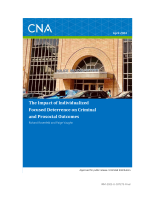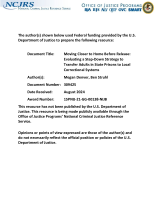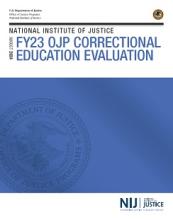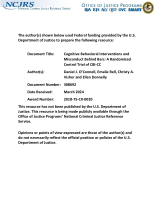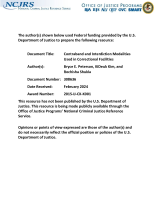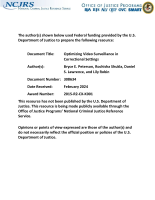Departments of corrections
Technology-Enabled Intervention to Enhance Mindfulness, Safety, and Health Promotion Among Corrections Professionals: Protocol for a Prospective Quasi-Experimental Trial
Technology-Based Solutions for Enhancing Corrections and Reentry: Recommendations for Technology Vendors
Interactive Computer-Assisted Recovery Enabler (ICARE): Treatment Support Tool for Substance-Using Offenders, Final Technical Report
City of Seattle Comprehensive Communities Program End of Grant Report, October, 1998
Experimental Comparison of Two Self-report Methods for Measuring Lambda
Measuring Crime Rates of Prisoners
Relationship Between Violence and Mental Disorder
Validation of the Iowa Risk Assessment Scale on a 1982 Release Cohort of Colorado Inmates
North Carolina's Determinate Sentencing Legislation: An Evaluation of the First Year's Experience, Executive Summary, Discussion Draft
The Impact of Individualized Focused Deterrence on Criminal and Prosocial Outcomes
Contraband and Interdiction Strategies in Correctional Facilities
Celebrating 10 Years of NIJ’s Law Enforcement Advancing Data and Science (LEADS) Scholars Program - 2024 NIJ Research Conference
In 2014, NIJ established the Law Enforcement Advancing Data and Science (LEADS) Scholars Program to support research-minded, mid-career sworn law enforcement officers working to integrate research into agency policy and practice. The LEADS Scholars Program helps participants develop independent research and provides support to identify current evidence on priority issues.
See the YouTube Terms of Service and Google Privacy Policy
The relationship between participation in structured activities and health, safety and quality of life outcomes for prison residents and staff
Moving Closer to Home Before Release: Evaluating a Step-Down Strategy to Transfer Adults in State Prisons to Local Correctional Systems
FY23 OJP Correctional Education Evaluation Package
Redesigning Life in U.S. Prisons
The prison system in the U.S. typically places a heavy emphasis on security, control, and punishment, and this foundation can create an adversarial culture within correctional facilities — incarcerated individuals versus correctional staff. But what if that culture could change? What would it look like? How would it impact not only incarcerated individuals but also correctional officers and other staff?



